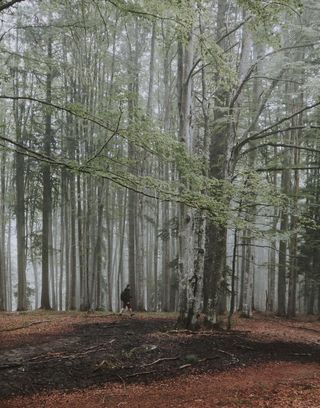Resilience
Get Comfortable With Discomfort
What do resilience and the Finnish concept of "sisu" have in common?
Posted October 7, 2019 Reviewed by Davia Sills

Leena was from Finland. She came to Washington D.C. to take a job. She found her work exciting and all that she imagined, yet she often spoke of how, when she and her family were in their home country, she never worried about her son. In Finland, he was usually in the forests walking and running and simply being in nature. In Washington D.C., she worried all the time where he was and what he was doing, because there were no forests at hand.
I found it hard to imagine feeling that her son was safe because he could go to the forest. What was it about the Finnish culture that this was the reference point? Then I read The Finnish Way: Finding Courage, Wellness, and Happiness Through the Power of Sisu by Katja Pantzar.
This little book introduced me to the Finnish word sisu (pronounced "see-su," according to the author). It is a word that does not translate into a single English word. It refers to a “unique type of fortitude, of resilience, of not giving up in the face of a challenge, big or small, that anyone can develop.”
It’s a wonderfully rich definition of resilience, taking it another step beyond dealing with the unexpected. To the Finns, it is purposefully taking on the difficult—like plunging into frigid water in winter and doing so on a regular basis. It suggests that even if the challenge appears to be impossible, you still try to do it.
Later in the book, she quotes someone else who says, “Sisu is about getting comfortable with discomfort.” This was music to me. I had just finished writing a book[1] that ended with the words, “Never confuse comfort with safety. Get comfortable with discomfort!”
As I pondered the relationship between sisu and how I define resilience, I realized that most people think of resilience as bouncing back after a shock. This is important for all of us, especially in this time of uncertainty and change, but I saw it as something that can be prepared for by putting yourself into discomfort and consciously making a decision to step out and onward. I thought I was original in my thinking, but I was not. In Pantzar’s book, I was introduced to an entire culture that builds into the day-to-day all manner of means to get comfortable with discomfort.
Some writers might be concerned that their thinking was not new if they saw the same language being used by another. I have never felt this way. When your own discoveries and conclusions match things that have been around for centuries, it confirms not just the idea, but also the thinking that went into it. Confidence in your ability to research, analyze, and conclude grows. And confidence in who you are and your capabilities also builds resilience.
So, if you don’t wish to try swimming in frigid waters, Pantzar recommends you ride your bicycle to work regardless of the weather, go to a place where you can experience the deep silence of nature, accepting and restricting yourself to eating only what is in season.
In my work, I recommend taking time in silence to allow yourself to reflect (as if you were in a forest), decide the most important thing to do for the day (regardless of other pressures or weather), or ask a question every day (such as why do we expect to eat strawberries in December?) OK, I don’t have a strategy that is as challenging as swimming in frigid waters.
Whether you are drawn to Pantzar’s list or mine, these lists are the start. In both cases, it is about consistency that every day builds and supports a willingness to take on even the impossible.
Being comfortable in discomfort is the mindset. The actions merely prepare your body to join in and support a resilient life—one that aspires to live in sisu as well.
[1] From Unlocked: Discover how to embrace the unexpected to be published in October 2019.
References
Pantzar, Katja (2018) The Finnish Way: Finding Courage, Wellness, and Happiness Trough the Power of Sisu, New York, TarcherPerigee Book.


